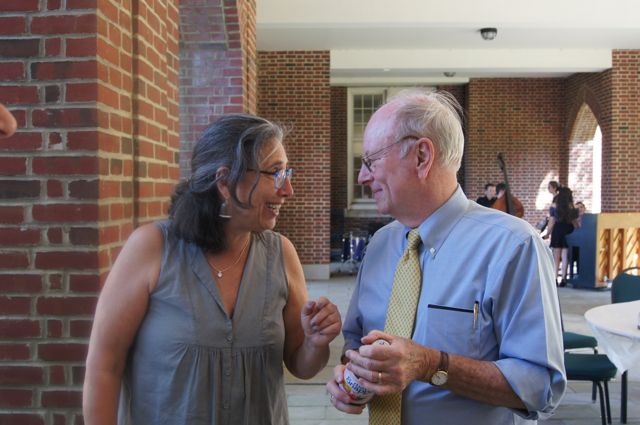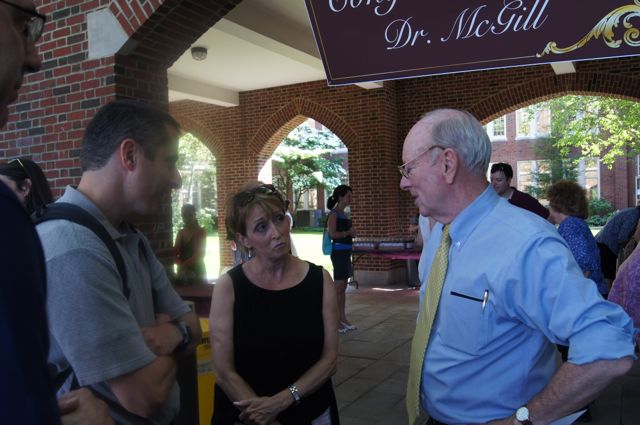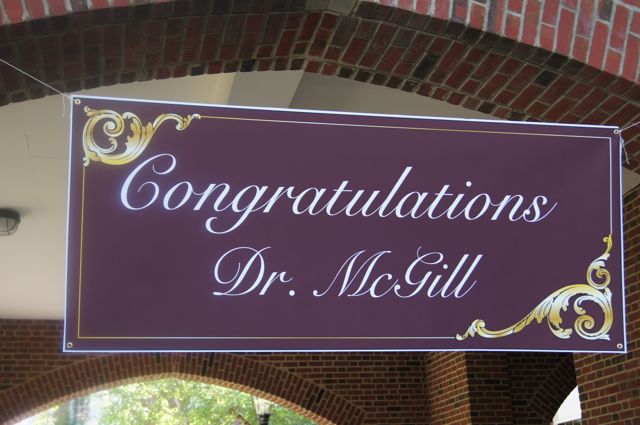Dr. McGill Says Goodbye with Concern and Affection
- Wednesday, 25 June 2014 08:43
- Last Updated: Wednesday, 25 June 2014 08:48
- Published: Wednesday, 25 June 2014 08:43
- Joanne Wallenstein
- Hits: 6192
 Here are retiring Superintendent Michael McGill's remarks at his last Board of Education Meeting on Monday June 23, 2014:
Here are retiring Superintendent Michael McGill's remarks at his last Board of Education Meeting on Monday June 23, 2014:
Dear Members of the Scarsdale Schools Community, Before I enter the ranks of the lately departed and begin to fade into history – I'm talking about career transition here, not dire metaphysical change – I want to share some observations about the State of the Schools. The impetus was the recent unearthing of remarks by my distinguished predecessor, Tom Sobol, at his last Board meeting 27 years ago. The relevance of his reflections is a sign of his wisdom, but it also tells us that the more things change, the more they're the same. Like him, I speak "in a spirit of concern and affection for a place and for people I have come to love."
"We are rightly proud of the way things are. But please remember that change is necessary and desirable."
Over the past decade and a half, we've sought to create a "Scarsdale Education for Tomorrow," a reinvigorated experience in liberal learning that aims to foster excellent thinkers and problem solvers, global perspective, and an ethic of service, "non sibi."
Scarsdale teachers have focused more intentionally on developing students' thinking  and self-expression. They've introduced inquiry research program and culminating inquiry projects in the elementary and middle schools. The High School has an Advanced Topics program. A Center for Innovation encourages broad-scale change in whole programs, schools and the District.
and self-expression. They've introduced inquiry research program and culminating inquiry projects in the elementary and middle schools. The High School has an Advanced Topics program. A Center for Innovation encourages broad-scale change in whole programs, schools and the District.
Growing numbers of students participate in "global-for-all" experiences abroad. More inclusive curriculums explore world cultures and include the study of cross-disciplinary issues like sustainability and water rights. Scarsdale students benefit from the study of Mandarin and elementary grade Spanish. Our Global Learning Alliance of schools and colleges seeks to identify practices that met a high international standard.
Non sibi activities include Circle of Friends, Human Rights Day, the Middle School Empathy Project and the High School's first year service expectation. The Schools have also committed to reduce their carbon footprint 10% below the 1990-91 level by the year 2020, in order to "meet the needs of the present without compromising the ability of future generations to meet their own needs."
Many of these efforts employ emerging technologies and all depend heavily on an enhanced program of continuing professional education.
In the early 2000's, Scarsdale undertook a decade-long, $90 million dollar, construction program, the largest single such effort in District history. There were major improvements at every building, including award-winning libraries; classrooms, science labs and athletic facilities. New plans are emerging to improve the elementary and middle schools, and to create a 21st century Learning Commons at the High School.
In 2001, meanwhile, parents boycotted state tests that threatened to narrow curriculum and promote a test prep mentality. The Schools subsequently concentrated on providing a "deep, rich program, letting the scores take care of themselves," as a far-sighted Board of Education said. A little over a decade later, the faculty, the Board and Parent Teacher Council reaffirmed this commitment by supporting what the faculty described as "A Declaration of Intellectual Independence."
Going forward, and consistent with the Board's injunction of 1933, Scarsdale must continue to remain abreast of new developments, even as it relies on methods that are proven. Any organism that is not growing, is dying.
"Excellence and uniformity are not synonymous. Indeed, they are often not compatible. To 'excel' means to stand out – the very definition implies the opposite of uniformity. The way to get excellence from a staff is to encourage people to think and imagine and dare, and then to support them."
Three decades on, policy makers in Washington and Albany continue to rely heavily on a strategy of metrics, accountability and competition to improve public education. The results of this approach have been unimpressive. It's made education more standardized, more routine, more average. Student performance on the National Assessment of Education Progress rose as much in the years before it became fashionable as in the years after.
Ironically, meanwhile, forward-looking corporations invest in human capital and do their best to foster trusting, collaborative work environments. Enlightened education policies would likewise sponsor the students and teachers who are at the center of the enterprise. As the University of Cambridge's Michael McIntyre has said, "measuring everything is both a mirage and a huge waste of resources...." Where complex organizations like schools are concerned, "There's actually no alternative to reliance on trust and to rebuilding trust where necessary -- for instance, trust in professional ideals and ethics.
Knowing the importance of flexibility and diversity, an advanced society facing the uncertain future will also find new ways of encouraging, among schoolchildren and their teachers for instance, other unmeasurables such as the curiosity, interest and enthusiasm, and the personal room for creativity, that are crucial to the development of high-level skills, versatility, and world-beating performance.... (It) will have rediscovered and acknowledged the fact that the most highly developed skills and learning come from the ignition of interest, not the imposition of auditing."
"Our schools have long depended in part for their quality on a high level of community volunteerism.... One of its most demanding forms is service on the Board of Education. Over the years, I have had consistent admiration and gratitude for the time and energy these dedicated Board members have expended on the community's behalf."
Especially following the economic downturn, calls to do more with less have intensified everywhere. Meanwhile, public expectations for performance and service grow. A new populism trumpets the virtues of transparency and demands more institutional responsiveness to public opinion. Boards of Education have to contend with and try to reconcile these and other tensions. It's hard work and there are few simple answers.
Our system of public education assumes that the people who govern schools, boards of education, represent the people. At the same time, school board members in New York State are called "trustees" because they've been entrusted with welfare of the institution. So in Scarsdale, historically, Boards of Education have understood that they weren't just reflecting public opinion but acting as stewards and champions of one of the nation's great institutions of learning.
On one hand, therefore, the trustees' job is to set broad direction for the schools that's consistent with core community values. Absent clear community consensus and where specific issues are concerned, it's to determine what in their informed judgment will best serve the long term interest of children and community, and to educate others to support their lead.
It can be hard to sort the issues and to know what's right. Community values may be unclear or in conflict. There may be disagreement about what will serve students best. Historically, Scarsdale Boards have faced these challenges by deliberating thoughtfully, and working collegially. They've done their best to act without fear, favor, or undue concern for their own popularity. That's what the large majority of community members expect.
Given today's ambient pressures, living up to this tradition and these expectations is and will continue to be a special challenge. Community understanding and support for the Board and this process have never been more important.
"I would urge the community to treat its teachers and other employees better. I am not talking about money. I am talking about respect and civility and common decency."
Public discourse in America has taken a nasty turn. Coincident with economic stress, resentment over taxes and sentiment that education should operate on hard-edged business lines, teachers and other public employees have come under attack. At times, the tone of comments seems almost to reflect a perverse sense that "if my life has gotten more difficult, yours should, too." Hard feelings can devolve quickly into verbal assaults on individuals. The tawdry dynamic says a lot more about the attackers than about the people they denigrate.
In Scarsdale, at least as I've experienced it, the vast majority of encounters between educators and residents is cordial and productive. Exchanges that might start out being difficult usually resolve into some kind of mutual, workable accord. However, we get into trouble when we depersonalize each other in the blogs, complain behind one another's backs or generalize about each other in the collective: when we talk about "incompetent teachers" or "crazy parents," for example. On occasion, bad feelings erupt in public statements.
This kind of divisiveness is simply unhelpful. While a certain amount of grousing is unavoidable in any human community, discourtesy and unpleasantness – as well as basic unfairness – just generate conflict, anger and more division. That makes it harder to reach the best outcomes for all.
The truth is that most teachers and, indeed, most public employees, are decent people who want to do a good job. Like everyone else, they deserve respect simply out of a sense of basic human decency. But from a purely self-interested point of view, treating others as if they're the hired help – or worse – isn't productive. It certainly doesn't give them an incentive to be more thoughtful, more giving or more effective. People flourish and they want to give back when they feel valued. We can have robust discussions and we can disagree without personalizing issues or going on the attack. Scarsdale is better than that.
"Finally, I would urge our schools and our community more often to look beyond their borders. We must remain aware of what is happening in the larger society and, in our case, particularly what is happening to schools and young people in our larger society."
A true democracy cannot endure when a people is sharply divided between rich and poor or when large numbers of people are the victims of social injustice. That road leads to bitterness and unrest, conflict and darkness; as a nation and as a community, we rise and fall together. Scarsdale is unusually fortunate in its human and financial resources, and to whom much is given, from them is much expected. It's both right and in our common interest to hasten the day when all children receive a quality education that equals the one Scarsdale children receive.
Also, Scarsdale has aspired to become not only a nationally-recognized institution, but one whose interests and reach are global. That may sound presumptuous or grandiose. Our human and material resources notwithstanding, after all, we're only a single school district in one small community. Nonetheless, our mission is to prepare graduates for lives of success and leadership in the global community, which means we must think globally. In addition, as Singapore's Minister of Education has said, others around the world look to Scarsdale for leadership. That's a significant responsibility. It calls the schools and the community to think big, to make their goal the sky, their aim the star. Without a great and generous vision, excellence can't exist.
I've been privileged to serve the children and the people of this extraordinary place. It's been a great ride. I take my leave, looking forward to a new venture in higher education, where I hope to play a positive part in the national discussion about school reform, as well as back at what we've all collectively achieved here over the last decade and a half. I honor those who've made Scarsdale, Scarsdale; I cherish the many friends I've made here and I look ahead to a future in which this great institution rises to even greater heights. If any community in the United States – or in the world, for that matter – can realize the ideal of an exemplary public education in the liberal arts tradition, it's this one.
With great good wishes, I am
Sincerely,
Michael V. McGill







